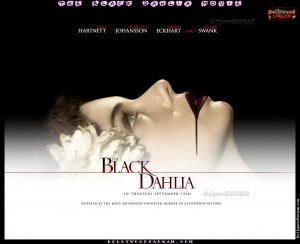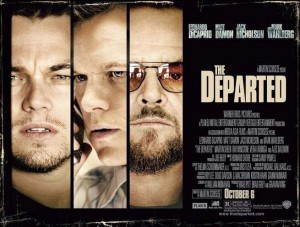Passion of the Christian Audience National Post Friday, December 08, 2006
 Quentin Tarantino has said the sign of a good film is that it makes you want to go home, eat some pie and talk about it.
Quentin Tarantino has said the sign of a good film is that it makes you want to go home, eat some pie and talk about it.
With that in mind, our Popcorn Panel features film buffs feuding in this space each week.
This week’s panel
– Craig Courtice, a short filmmaker who isn’t very tall
– Christa Oancia, mom of five, religion teacher and amateur movie critic
– Richard Crouse, host of Rogers Television’s Reel to Real, Canada’s longest-running movie review show and the author of The 100 Best Movies You’ve Never Seen (ECWPress, 2003). His Web site is www.richardcrouse.ca This week’s pie Shepherd’s
This week’s subject: The Nativity Story
Craig: Whatever you might think of The Passion of the Christ, it was the work of an auteur. Director Catherine Hardwicke is a talented filmmaker, but she lacks the leverage and the ego of Mel Gibson, and as a result I’m not sure The Nativity Story is her vision. For one, there is nothing of the realism she made her name with in Thirteen. Part of the reason the birth of Christ still fascinates us today is the overwhelming odds Mary and Joseph overcame. Certainly, in their journey to Bethlehem, they must have forged an incredible bond, yet there are few scenes that give us a sense of their relationship. Instead, we are subjected to a history lesson featuring King Herod, Zechariah and Elizabeth in the first act and requisite scenes with shepherds and wise men in the third.
Christa: I don’t think Mel Gibson is a good comparison because The Passion was truly his vision. Hardwicke was hired to direct someone else’s vision. It appears that the team behind The Nativity relied primarily on the very limited two Gospel accounts of the birth of Jesus. There was a strong effort to show the evolution of Mary and Joseph’s relationship from one of obligation to one of deep mutual caring and respect. I think Hardwicke did a great job making this story more realistic than most. This account is usually so romanticized that we rarely think beyond the basic details of that holy night. I didn’t go to the movie with the same expectations as I did with The Passion, probably because I didn’t expect the same quality from someone who doesn’t completely live and breathe this story in their life.
Richard: Perhaps Hardwicke doesn’t live and breathe this story, but she is a filmmaker charged with creating a compelling and interesting movie, and I think she let her audience down. Her last two films, Thirteen and The Lords of Dogtown, were edgy examinations of teenage life that dealt with young people in crisis. The Nativity Story covers the same ground, but this time her young protagonists, Mary and Joseph, have larger issues than acne or a spotty report card.
Craig: I think we can all agree The Nativity Story won’t go down in history as a cinematic masterpiece with the likes of The Ten Commandments or The Passion. But just the fact this movie got made seems like a minor miracle. Although 77% of Americans identified themselves as Christian in 2001, Jesus-friendly titles aren’t exactly flooding the multiplexes. Are most Christians just not interested in watching movies about their religion or is Hollywood not willing to back up these films? Let’s not forget, that for all of The Passion’s success, Gibson financed the project himself.
Christa: It won’t hit page one of the paper that Hollywood is not exactly pro-Christian. A quick glance at the top all-time movies shows that Star Wars, Shrek, E.T. and Finding Nemo are the home runs in theatres, yet Hollywood keeps showing its love of R-rated releases. Not sure if it’s about artistic dreams, shock value, Oscar envy or all of the above. Lately, the business side is figuring out that family-friendly, and yes, even Christian movies (thanks Mel) can be moneymakers. I think it’s not really about whether Christians are interested in watching family-friendly movies as much as it is about the lack of interest of filmmakers in making them. Mel has helped raise the bar with artistic merit, quality and morality all in one — what a concept! It’s not a guarantee, however, and the Christian audience will still expect high quality for their movie dollar.
Richard: The success of The Passion should have paved the way for a tsunami of Christian themed films at the theatres, because the only thing Hollywood really understands is success. If a documentary about penguins can make a lot of money then why not make a kids’ series about the little furry birds? But I think studio heads realized The Passion’s success was a fluke. It was a great marketing strategy coupled with enough controversy to get people who hadn’t gone to the movies in years interested to see what all the fuss was about. It is hard to capture that kind of lightning in a bottle twice, which is why we haven’t seen a cavalcade of Christian films in mainstream theatres.
________________________________________
In Soviet Russia, Yakov Smirnoff would’ve killed for this publicity
National Post
Friday, November 10, 2006
Quentin Tarantino has said the sign of a good film is that it makes you want to go home, eat some pie and talk about it. With that in mind, our Popcorn Panel features film buffs feuding in this space each week.
THIS WEEK’S PANEL
– Basem Boshra, associate editor of Weekend Post
– Craig Courtice, a short filmmaker who isn’t very tall
– Richard Crouse, host of Rogers Television’s Reel to Real, Canada’s longest-running movie review show, and the author of The 100 Best Movies You’ve Never Seen (ECW Press, 2003). His Web site is www.richardcrouse.ca
THIS WEEK’S PIE Chiburekki (a deep-fried dough cake from Borat’s homeland)
THIS WEEK’S SUBJECT Borat: Cultural Learnings of America for Make Benefit Glorious Nation of Kazakhstan
BASEM: As a guy who used to download clips of the British version of Da Ali G Show long before it made its way to the colonies, I’d like to think my Borat bona fides are unimpeachable, and I couldn’t have been more excited about his big-screen debut. That anticipation was stoked even further by the rapturous reviews that preceded its release. But while the film made me laugh so hard at times that I hope the theatre staff steam-cleaned my seat after I left, I couldn’t help feeling a bit let down by all the hype (which I allowed myself to be sucked into). Borat: Superfluously Long Title that Stopped Being Funny After I Read It the First Time is, in essence, some good-to-great Borat sketches strung together by a flimsy excuse for a plot. Then it dawned on me: The people penning those glowing notices must not have been all that familiar with Borat’s small-screen oeuvre, the best of which, I’d argue, is stronger than anything in this movie. (If it sounds like I’m down on Borat, I’m not; it’s hilarious, if a tad overlong, even at 84 minutes. It just served as another reminder to keep my expectations measured even in the face of such cheerleading reviews.)
CRAIG: In a nice bit of programming, Showcase had a Da Ali G Show marathon on last weekend, and I caught four or five episodes after watching Borat. Hard to fault Sacha Baron Cohen for going after the big bucks and exposure this film will bring him, but you’re right, Basem, the material fits the TV format better. But I’m more interested in the hype machine that accompanied this baby. Kudos to the producers for a witty PR campaign: having Cohen appear as Borat, inviting George Bush to a screening — this was like old-time hucksterism, and obviously the movie-going public loved it. But I have to admit I’m ashamed (again) of the pack mentality of entertainment journalists. In the Canadian media, just last week, we had stories comparing Borat to Archie Bunker (Maclean’s) and Andy Kaufman (Toronto Star). I’m sure some hack somewhere pulled out the post-9/11 angle. It’s a shame Yakov Smirnoff, Borat’s comedic predecessor (sample joke: “In Soviet Russia, if a male athlete loses, he becomes a female athlete”), didn’t get the same kind of PR in the ’80s. He might have made it beyond guest starring on Night Court.
RICHARD: Hey Craig, you forgot to mention The Wild and Crazy Guys from vintage Saturday Night Live. Their accents and attitudes toward women predated Borat by a few decades. The Borat family tree branches off to include guerilla comics who specialize in accosting unsuspecting civilians — Allen Funt is Borat’s great granddaddy, Tom Green the red-haired stepchild, while the fish-out-of-water routine, the ethnic humour, mockumentary style and total immersion in the character owes thanks to The Beverly Hillbillies, Redd Foxx, Christopher Guest and Andy Kaufman respectively. So the character of Borat isn’t a completely new thing. What is new is the way the film was promoted. Having Borat arrive at a red-carpet event in a rustic wagon pulled by peasant women was a stroke of genius. The stunt at the White House and Borat’s offer to sell his grandchild to Madonna were as gut-busting as anything (except maybe the nude wrestling) in the movie and put to shame more conventional attempts at movie hucksterism. When you have risked the wrath of the White House, having a junket at the Four Seasons seems a little tame. What may have seemed like a series of frat-boy hijinks was actually a carefully orchestrated campaign. In terms of the future of the character the campaign may have worked too well — the popularity of the movie and the public awareness of the character has destroyed any chance that Borat will return in his present form. He’d have to go to Mars and pull pranks on unsuspecting aliens because everyone on Earth knows who he is.
BASEM Another critical reference point I’ve heard thrown around (which makes no sense to me) is Jackass. Granted, there’s one prolonged physical gag in Borat — those who have seen it will know the one I’m referring to — that’s as excruciating to sit through as anything Johnny Knoxville and his depraved cohorts have ever conjured up. But that’s where the similarities end. Cohen’s much-dissected brand of social satire — which he ingeniously wraps inside just enough wacky shtick to keep even the frattiest boys engaged — operates on a level the Jackasses couldn’t begin to fathom. (And I thought Number Two was one of the most cathartic and invigorating movie experiences of the year.) In any case, I think much of the (over?) analysis of Borat will soon be rendered moot. Unless Hollywood backs the Brink’s truck up to Cohen’s door — a definite possibility, given the film’s sensational box office — I can’t imagine he would ever want, or have any reason to, revisit Borat. B:CLOAFMBGNOK is about as far as you can take a character before self-parody sets in, and Cohen seems just too savvy to let that happen (he says hopefully).
CRAIG It’s funny you mention Jackass because in the notes I scratched down after watching Borat I wrote: “Expectations too big for what is basically small-screen experience; at least Jackass has some truly big-screen moments.” Which is to say that most Jackass watchers went in expecting video-shot stunts, but came out surprised, whereas most of the patrons who go to see Borat go without knowing it is a digital experience. Borat may top Jackass at the box office, but it will be in DVD sales that these expectations play themselves out. I would guess that those who watched Jackass in the theatre would be more likely to pay a second time to see it, whereas with Borat once you’ve seen it, you’ve seen it. You have to admit by the end of Borat the gags are as original as a Rick Mercer segment. Except for the nude wrestling, of course.
RICHARD Borat may be a boob-tube experience blown up for the big screen, but at least it’s a good one. Jackass: Number Two has its moments but mostly reeks of Ben-Gay and “Look at me!” desperation. Borat, on the other hand, provokes real laughs and perhaps — gasp! — even some real thought. The Jackass oeuvre only makes us chuckle because it is so stupidly brutal. While brutal can be funny, on the big screen I find the act of watching these movies as punishing as participating in one of Johnny Knoxville’s more sadistic stunts. At just 84 minutes, Borat does what good movies do; it doesn’t overstay its welcome and leaves the audience wanting more. With such a lean running time the jokes don’t have time to get stale and, while some of the gags may be from the Rick Mercer school of comedy, most aren’t. Mr. Mercer might attempt to see how much gas 17 cents will buy, but has he ever offered a dignitary cheese made with milk from his wife’s tit? I don’t think so. As for DVD sales, who knows, but I think the extras and outtakes on the Borat disc will be worth the 20 bucks.
NEXT WEEK’S PIE Dark chocolate macadamia nut wedge
Unpopped kernels: More on Borat flick
National Post
Basem: You know what. I officially think I’m Borat-ed out. (I knew that would happen, but not so soon.) So how about this news that Universal is shelling out US$42.5-million for the distribution rights to Cohen’s next project, a Bruno movie, featuring the third and, to my eyes, least interesting of his Da Ali G Show triumvirate. The one accusation you regularly hear levelled at Borat is that he’s a one-note character — although I prefer to think of sexism, racism and anti-Semitism as three separate notes, thank you very much — but he’s a complex comic creation next to Bruno, who’s an aggressively gay fashion reporter and … er, that’s about it, as far as I can tell. He has his moments, don’t get me wrong, but are there enough of them (say, 80 or so) to string together for a feature film? I hate to doubt Cohen, who’s certainly one of the most nimble comic minds in the business today, but I just don’t think so. Actually, what I’d love to see him do one day is revisit Ali G in a Borat-style mockumentary, if only to wash away the bad taste left by his atrocious Ali G Indahouse film, hands-down the lamest thing SBC’s been affiliated with (give or take a Madonna video.)
Craig: Maybe I’m just farther to the right on the Kinsey scale, but I look forward to a more in-depth, er, exploration of Bruno. There’s certainly enough homoeroticism in Borat, I figure why not just get it all out there. Besides, while every Bruno segment isn’t comedy gold, there is something much darker, and to my mind, more interesting in probing (there I go again) the not-so-hidden homophobia that runs rampant in North America. I’m thinking of the segment in which Bruno goes to a gun show and interviews an aficionado. The redneck-meets-rainbow shtick is just as savvy as Cohen’s other stuff, but it has something more — danger. It’s all fun-and-games when the gun guy goes off about his love of big calibres, but the punch line here is just that — when Bruno tells him he’s from Gay TV, Colt .45 threatens to knock his teeth out if he mentions the word “gay” one more time. My point is, Bruno’s a lot edgier than Borat or Ali G because of the less-accepted subject matter. It wouldn’t be as popular as Borat, but it could be better.
Richard: Edgy, schmedgy. I fear a Bruno movie would be more of the same. He’s funny enough, but I always thought his segments were the weakest on the television show. Having said that I don’t really want more Borat either. I agree with Basem. The more people quote him to me, the more people say “Nice!” in that Kazakhstani lilt the more I realize very soon I’m going to need a rest from it. I look forward to spending some time with Bruno, but not just yet. I need time. I’m not ready for another SBC essay into America’s heart of darkness whether it is from a gay perspective, a British-Jamaican b-boy standpoint or the point of view of SBC in a bear suit. Let’s allow him to take some time off, recharge and come up with a new idea, perhaps one that doesn’t see him doing another mock doc with a different character.


